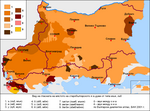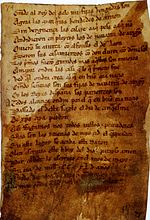Bulgarian pronouns change according to gender, number, definiteness and case. Pronouns are classified as: personal, possessive, interrogative, demonstrative...
17 KB (1,336 words) - 02:13, 29 March 2024
a pronoun is "you", which can be either singular or plural. Sub-types include personal and possessive pronouns, reflexive and reciprocal pronouns, demonstrative...
31 KB (3,454 words) - 18:28, 17 August 2024
nouns#Count form for more details. See Bulgarian nouns#Usage for more usage notes See Bulgarian pronouns#Personal pronouns for more details. The word или ('either')...
44 KB (4,853 words) - 15:26, 18 July 2024
vocative) and definiteness in Bulgarian. Adjectives and adjectival pronouns agree with nouns in number and gender. Pronouns have gender and number and retain...
114 KB (12,998 words) - 14:56, 11 August 2024
Bulgarian dialects are the regional varieties of the Bulgarian language, a South Slavic language. Bulgarian dialectology dates to the 1830s and the pioneering...
16 KB (1,033 words) - 23:21, 27 December 2023
used. Old Bulgarian relative pronouns иже, яже and еже ("which," masculine, feminine, neuter) were at that time replaced by interrogative pronouns with the...
10 KB (1,209 words) - 23:37, 20 February 2024
languages such as Hindi, the relative pronouns are distinct from the interrogative pronouns. In English, different pronouns are sometimes used if the antecedent...
7 KB (895 words) - 15:01, 3 July 2024
Chinese pronouns (Chinese: 代词/代詞; pinyin: dàicí or Chinese: 代名詞; pinyin: dàimíngcí) differ somewhat from pronouns in English and other Indo-European languages...
19 KB (1,426 words) - 01:46, 14 August 2024
Reflexive pronouns also have forms for both direct and indirect objects: себе се, себе си. Examples of personal pronouns are shown below: Personal pronoun: Јас...
103 KB (10,310 words) - 00:04, 22 July 2024
third-person pronoun is a pronoun that refers to an entity other than the speaker or listener. Some languages with gender-specific pronouns have them as...
111 KB (11,070 words) - 22:43, 14 August 2024
types that are indisputably pronouns are the personal pronouns, relative pronouns, interrogative pronouns, and reciprocal pronouns. The full set is presented...
33 KB (3,168 words) - 14:59, 27 July 2024
pronouns are not a distinct part of speech, but a subclass of nouns, and they behave grammatically just like nouns. Certain faux-archaic pronouns may...
31 KB (1,497 words) - 03:29, 28 April 2024
The English personal pronouns are a subset of English pronouns taking various forms according to number, person, case and grammatical gender. Modern English...
27 KB (2,745 words) - 22:18, 30 July 2024
Portuguese personal pronouns and possessives display a higher degree of inflection than other parts of speech. Personal pronouns have distinct forms according...
41 KB (4,476 words) - 20:24, 13 June 2024
German pronouns are German words that function as pronouns. As with pronouns in other languages, they are frequently employed as the subject or object...
15 KB (1,499 words) - 15:39, 25 June 2024
Korean has personal pronouns for the 1st and 2nd person, with distinctions for honorifics, and it prefers demonstrative pronouns in the 3rd person, which...
13 KB (1,465 words) - 06:19, 12 March 2024
Spanish pronouns in some ways work quite differently from their English counterparts. Subject pronouns are often omitted, and object pronouns come in...
18 KB (2,520 words) - 15:27, 7 August 2024
Grammatical gender (redirect from Neuter Pronouns)
and pronouns have three forms in singular (e.g. Bulgarian червен, червена, червено or German roter, rote, rotes) but only one in plural (Bulgarian червени...
99 KB (12,112 words) - 19:46, 11 August 2024
Old Church Slavonic (redirect from Old Bulgarian)
are further divided into nouns, adjectives and pronouns. Numerals inflect either as nouns or pronouns, with 1–4 showing gender agreement as well. Nominals...
112 KB (11,992 words) - 20:24, 18 August 2024
and chúng ta mean "inclusive we"). The other class of pronouns are known as "absolute" pronouns. These cannot be modified with the pluralizer chúng. Many...
21 KB (2,028 words) - 09:33, 2 August 2024
Spanish personal pronouns have distinct forms according to whether they stand for the subject (nominative) or object, and third-person pronouns make an additional...
29 KB (3,506 words) - 15:16, 14 August 2024
boxes, or other symbols. The Bulgarian Cyrillic alphabet (Bulgarian: Българска кирилска азбука) is used to write the Bulgarian language. The Cyrillic alphabet...
27 KB (1,750 words) - 11:30, 8 June 2024
words relating to Cantonese pronouns, see the Cantonese pronouns category of words in Wiktionary, the free dictionary. Pronouns in Cantonese are less numerous...
11 KB (1,205 words) - 08:06, 15 May 2024
personal pronouns (analogous to English I, we, they, and so on). When compared to English, the particularities of French personal pronouns include: a...
15 KB (2,076 words) - 03:06, 9 April 2024
Old English grammar (redirect from Old English pronouns)
equivalents of "who, when, where" were used only as interrogative pronouns and indefinite pronouns, as in Ancient Greek and Sanskrit. Besides þā ... þā ..., other...
84 KB (8,372 words) - 01:57, 19 August 2024
T–V distinction (redirect from Intimate pronouns)
of different pronouns that exists in some languages and serves to convey formality or familiarity. Its name comes from the Latin pronouns tu and vos. The...
65 KB (3,730 words) - 06:12, 16 August 2024
pronouns that in some ways work quite differently from English ones. This page details their usage. For declensions, see Slovene declension#Pronouns....
16 KB (2,102 words) - 12:34, 30 October 2023
Oblique case (section Bulgarian)
pattern are shown in the tables below: Bulgarian, an analytic Slavic language, also has an oblique case form for pronouns: Dative role: "Give that ball to me"...
10 KB (977 words) - 11:52, 22 April 2024
Clitic doubling (section Macedonian and Bulgarian)
which clitic pronouns appear in verb phrases together with the full noun phrases that they refer to (as opposed to the cases where such pronouns and full...
11 KB (1,606 words) - 00:48, 6 July 2024
Arabic grammar (redirect from Arabic pronouns)
varieties that still possess separate feminine plural pronouns. The enclitic forms of personal pronouns (اَلضَّمَائِر الْمُتَّصِلَة aḍ-ḍamā’ir al-muttaṣilah)...
80 KB (6,808 words) - 04:23, 20 August 2024










